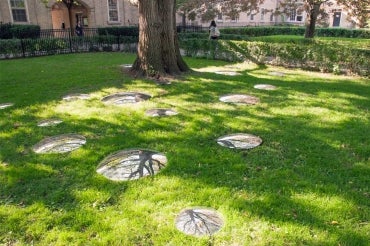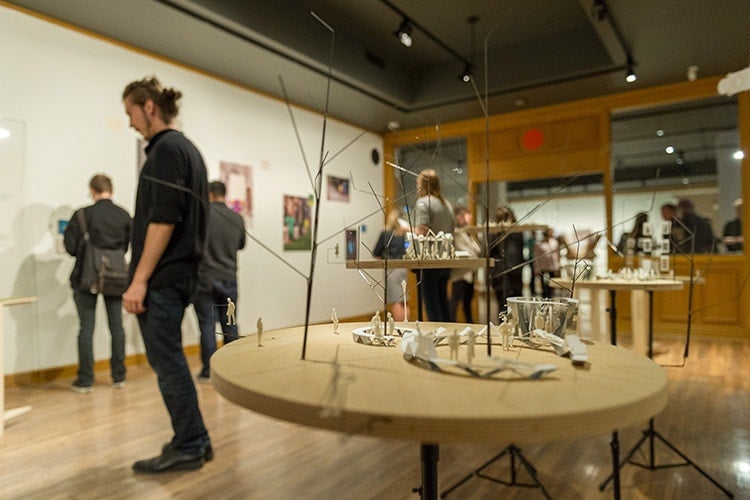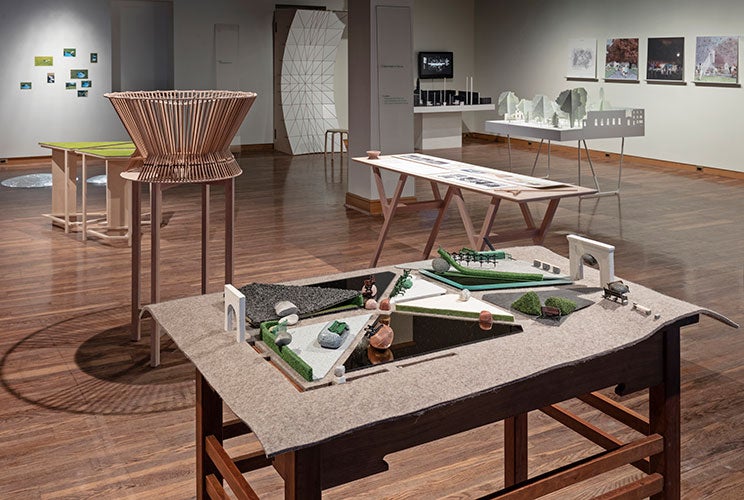Artists, architects reimagine a U of T quad for Art Museum exhibition

Published: September 27, 2017
Most University of Toronto students, faculty and staff have passed through Sir Daniel Wilson quad when cutting across the downtown Toronto campus – but they’ve never seen it quite like this.
Sprinkled around the leafy green space next to University College are 130 curved convex mirrors forming a giant circle on the ground. Each orb provides a unique perspective – forcing viewers to look up by looking down.
This mysterious installation, called Wa-Wa, was created by the architecture studio UUfie – founded by architect-designers Eiri Ota and Irene Gardpoit, U of T alumna of the John H. Daniels Faculty of Architecture, Landscape, and Design’s architecture program.
Wa-Wa is part of U of T Art Museum’s Making Models exhibition, which invited architect and artist collectives to create mini-models of an installation that can transform the quad under the theme “meet me there.”
While only Wa-Wa was displayed at full-scale in the quad – selected by a jury of experts from art critics to architects – the other eight models are displayed at the Art Museum’s Art Centre.

A view of design practice Lateral Office's model Rings/Rooms. The practice was co-founded by U of T Associate Professor Mason White (photo by Dominic Chan)
Viewers are encouraged to think about the quad – a space on campus they likely walk through every day but rarely pay close attention to – in a different light, says Yan Wu, curator-in-residence at the Art Museum.
“You will see something you didn't see before in this space – that's the best part of it,” she says.
The entries are diverse in form and content – from physical structures to dance performances.

Models on display at the exhibition. Spatial Sonic Network is seen on the back wall (photo by Toni Hafkenscheid)
One of the most striking – and interactive – models was created by Brady Peters and Mitchell Akiyama – assistant professors at Daniels who both study the intersection of sound and design.
Called Spatial Sonic Network, the installation plays with the idea of sound mirrors – structures that can focus sound waves to create specific acoustic effects.
The model is made up of two structures on either side of the room. If someone talks into one, a person sitting facing the other structure will hear them as clearly as if they were speaking into a microphone.
“If we think about architecture and sound, any kind of architecture modifies the sounds we create,” Peters says.
Spatial Sonic Network is meant to create intrigue and interactivity to encourage people to linger.
“It’s a combination of surprise and further investigation once you actually knew it was going on to enliven the square and make it more of a destination,” says Peters.
To design these complex analog structures, the duo needed some digital assistance. With the help of five architecture students - Sean Lamb, a master’s student, and undergrads Ous Abou Ras, Holly Wiersma, James Park, and Gianina Ramos – Peters and Akiyama wrote a computer program to create an algorithm (represented in the animation above) in order to find the exact points in the quad where the structures should be located so people could communicate with each other at a distance.
Wu says Spatial Sonic Network is a great example of how One Spadina – the new home of the Daniels faculty – can be used to foster collaboration and take advantage of cutting edge resources.
“It's good to see the art technologies available, especially at the new building,” she says.
As part of the exhibition, check out the Art Museum’s Instagram account on Sept. 30 from 2-4 p.m. for a virtual architecture tour of U of T by Globe and Mail architecture critic Alex Bozikovic. You can also vote for your favourite model at the exhibition and online until Oct. 7.
View Wa-Wa in the Sir Daniel Wilson quad until Nov. 25, and the exhibit at the Art Centre until Oct. 6.



